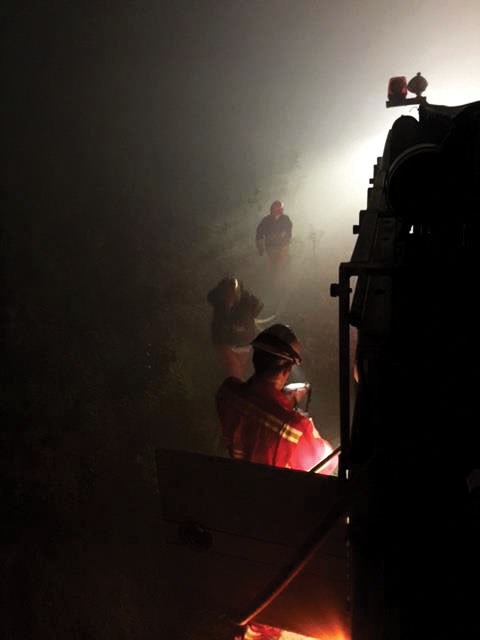Wildfire season isn’t letting up. On Aug. 29, the provincial state of emergency was extended to Sept. 12. About 3,200 people have been affected by 34 evacuation orders and another 21,800 people are on evacuation alert as 534 wildfires burn across the province.
Coast firefighters have been travelling to the interior to support crews fighting the Shovel Lake and Burns Lake fires since mid-August. Firefighters from Sechelt and Gibsons are home but those from Roberts Creek and Halfmoon Bay are still supporting BC Wildfire Service crews as fires continue to rage in B.C.’s interior.
Gibsons Volunteer Fire Department Chief Rob Michael said Gibsons sent a crew of four firefighters as well as a 2001 Freightliner pumper truck capable of carrying 1,200 gallons of water on Aug. 16. A replacement crew was sent on Aug. 22. The truck returned on Aug. 25 to be used for local emergencies. No further requests have been made for Gibsons to provide crew or engines, said Michael.
Two Sechelt firefighters were also deployed with an engine and were replaced by two more members, who returned home Aug. 25. According to Sechelt Fire Department Chief Trevor Pike, the Sechelt truck is back at the station and is awaiting re-deployment.
Roberts Creek Fire Chief Pat Higgins and firefighter Russell Monkman were joined by Gibsons firefighters Lt. Neil Donovan and John DiStefano in Roberts Creek Engine 4, following a callout on Aug. 13. That fire engine remains in use. “Because we received a new engine last summer, we basically have five responding apparatus, so what used to be our frontline engine was available for deployment,” said Higgins.
During the first deployment, the Roberts Creek and Gibsons firefighters were originally sent to Fort St. James but were redirected to Vanderhoof, where the OFC command post is located. More than 50 pieces of apparatus were deployed to Vanderhoof with crews of two to four firefighters, said Higgins.
“It’s impressive,” he said.
Coast crews were supporting efforts in the Shovel Lake fire, just north of Fraser Lake, sleeping in a secondary school in Vanderhoof. “A wonderful group of people from Echo Lake Bible Camp” cooked their meals, according to Higgins. The camp also gave up their lodgings to the firefighters. Then, as the fire moved towards the camp, the firefighters assisted with the evacuation of the camp. “Visibility was going downhill with the smoke filling up their camp,” said Higgins. “They relocated to a chapel in Vanderhoof, which is where they continued to feed us with smiles on their faces,” he said. “It’s pretty amazing.”
Last week, the Roberts Creek deployment was shifted to Burns Lake after the Shovel Lake fire was contained and no longer required structural firefighting support.
“A couple of our shifts it was solid smoke. You could see maybe two or three feet in front of your truck driving down the road,” said Higgins of his time in the interior. “It took a couple days for the smoke to come out of our pores once getting home. I was told I still smelled like smoke after showering a few times,” said Higgins. Firefighters use high quality dust masks and respirators to filter the air.
A second Roberts Creek rotation participated in night operations at Burns Lake, supporting sprinkler protection units and BC Wildfire Service in filling their portable tanks. Roberts Creek assistant chief Sean Hatanaka and firefighter David McIlwraith were deployed with Roberts Creek Engine 4, in addition to Glen Porter and Tom Wayte with the Halfmoon Bay Fire Department.
A third Roberts Creek and Halfmoon Bay crew has also been deployed, including Russell Monkman, Brian Houle and Halfmoon Bay training officer Dan Olsen and firefighter Ben Borowski. Higgins said a number of 14-day contracts have been extended to support firefighters at Burns Lake and that a fourth crew could be sent next week.
Coast-wide coordination between departments and the regional district ensures that coverage areas within the Coast aren’t short on engines or crewmembers, said Higgins. All firefighters have returned without injury.
Higgins also emphasized that BC Wildfire Service firefighters do the bulk of the work. “They don’t get that same kind of recognition and yet they’re out there all the time,” he said. “It’s got to be the hardest job on the planet.”



